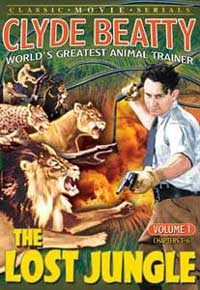 Lost Jungle stars real-life circus animal trainer Clyde Beatty. He was the "classic" sort who went in a big wire cage with a long whip & smoking pistol that shot blanks, sometimes holding a chair like a shield, forcing lions & tigers to sit on big stools. In Lost Jungle he pretends to be a bring 'em back alive jungle hunter, perpetuating a myth about how wild-obtained zoo, circus, or petshop wildlife reached America. Lost Jungle stars real-life circus animal trainer Clyde Beatty. He was the "classic" sort who went in a big wire cage with a long whip & smoking pistol that shot blanks, sometimes holding a chair like a shield, forcing lions & tigers to sit on big stools. In Lost Jungle he pretends to be a bring 'em back alive jungle hunter, perpetuating a myth about how wild-obtained zoo, circus, or petshop wildlife reached America.
As a point of history, hunters killed mother lions to steal cubs, & the hunters tended to be tribal peoples who might eat the bush meat of the parents & deliver the babies to missionaries who would get them to port cities where they'd soon be purchased by animal importers from various countries but primiarily America where the market for baby wildlife ran rampant & unchecked until the 1960s (& still continues at a less extreme level of activity even today).
This meant that for every gorilla raised in a zoo or circus, at least the mother & perhaps other group members were killed in order to get that baby. There was no such thing as captive breeding programs, & ever chimpanzee raised in captivity or seen riding roller skates or appearing in a movie was ripped from its dead & bloody mother's bodies. Mother tigers were killed to grab tiger kittens, & prides of adult lions were executed to take their cubs. Even littler monkeys sold in petshops, every single one of them had first to have their mothers shot out of the trees, & if the baby didn't die in the fall, didn't die of dehydration before it was delivered somewhere where someone would think to give it water, & didn't come down with some awful disease from the stress, it might then end up in a petshop to be sold as a fun baby wild animal.
Such a monkey would probably die of measils or pneumonia while still young, but if per chance it thrived, it would grow to be a large, smelly, short tempered adult no longer manageable by whoever raised it, who could only hope that some zoo would take it off its hands so that it didn't have to be put to sleep. For every one wild animal that made into some imbecile's private ownership & survives long enough to become no longer a pleasant baby, chances are a minimum of 100 of the same species died along the way.
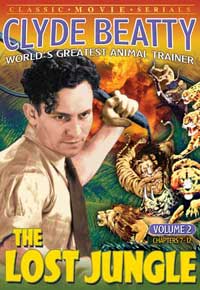 Starting especially in the 1970s increasing numbers of regulations moved this type of industry from a massive open market to a smaller black market. Today wildlife importers charge a premium for captive-born specimens, but wild-caught animals continue to be mixed into those stocks & bad practices continue. In Clyde's day, long before focus on captive breeding programs, there was no option but to get them from the wild. And it was never the case that adult wildcats were taken to the circus to be magically rendered safe enough to use in circus acts; kittens were raised so as to be human-reliant their whole lives & familiar with trainers. Starting especially in the 1970s increasing numbers of regulations moved this type of industry from a massive open market to a smaller black market. Today wildlife importers charge a premium for captive-born specimens, but wild-caught animals continue to be mixed into those stocks & bad practices continue. In Clyde's day, long before focus on captive breeding programs, there was no option but to get them from the wild. And it was never the case that adult wildcats were taken to the circus to be magically rendered safe enough to use in circus acts; kittens were raised so as to be human-reliant their whole lives & familiar with trainers.
In Lost Jungle's fantastical revision of how animals were obtained, there is a cool jungle somewhere where both lions & tigers live in the same territory, & Clyde could personally go catch 'em alive for his circus act. Travelikng by dirigible to "Noah's Ark Island" any beast required, from any continent, will be found during one swell safari.
Originally this was a 12 chapter serial, but the feature film version reviewed above condenses the entire original Mascott serial (an even shorter version consists of the last four chapters). Many events are missing from the condensed version, & even included events, like the visit to the ruins of a lost city (more like a lost clapboard house), are so truncated as to make no sense.
The full serial is happily available, & the story is a lot different, with Clyde's rival Sharkey taking the dirigible to the Noah's Ark island & Clyde going by sea, having other adventures before reaching that island. There's much stuff about finding treasure & of course each segment ends in a cliffhanger.
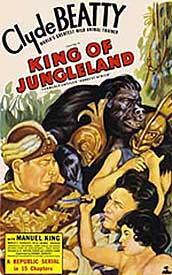 In whatever version one views, Clyde has a certain appeal, even though he makes the lamest Z actors look talented by comparison. And Lost Jungle oughtn't be on anyone's list of favorite serials as it just doesn't push its themes far enough. Serials that retain charm despite never having been dramatically of any merit do so on the strength of pushing the themes to campy extremes, & Clyde wanted to present his invented image "realistically" so its camp value is no greater than its dramatic value. In whatever version one views, Clyde has a certain appeal, even though he makes the lamest Z actors look talented by comparison. And Lost Jungle oughtn't be on anyone's list of favorite serials as it just doesn't push its themes far enough. Serials that retain charm despite never having been dramatically of any merit do so on the strength of pushing the themes to campy extremes, & Clyde wanted to present his invented image "realistically" so its camp value is no greater than its dramatic value.
Clyde Beatty also stars as himself in the Republic's very first serial, the 15-chapter Darkest Africa (1936) re-released in 1949 as King of Jungleland, with a condensed version edited for television in the 1960s as Batmen of Africa.
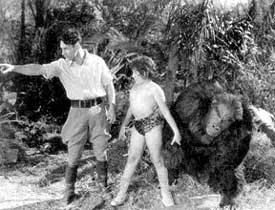 Represented in its day as the sequel to Lost Jungle, it is much more exciting for wonderfully goofy incident & additionally better made. Represented in its day as the sequel to Lost Jungle, it is much more exciting for wonderfully goofy incident & additionally better made.
It strides boldly into science fiction scenarios so striking that it has been suggested that Robert E. Howard's fantasy novel Almuric partially inspired the seriel, but as REH's novel was serialized in Weird Tales in 1939, so any resemblance is strictly coincidence, unless Howard, himself a movie fan, had been attending Saturday matinees for his inspiration.
Beatty goes to Africa to confront a race of flying bat-people & rescue the Goddess of Joba (obviously a degraded version of Haggard's She-Who-Must-Be-Obeyed), who is being held by the evil high priest of a hitherto unknown civilization.
The serial tells also of the jungle goddess's brother, Baru the Jungle Boy, lending this jungle feature a Tarzan interest. Baru is played by Manuel King, billed on his father's wild animal ranch in Texas as "the world's youngest animal trainer." Baru's best friend is the ape Bonga. The ape as well as Samabi the leader of the Bat People were both played by Ray Benard, later Ray "Crash" Corrigan.
copyright © by Paghat the Ratgirl
|
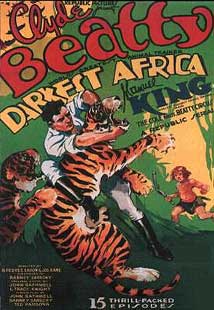

 Starting especially in the 1970s increasing numbers of regulations moved this type of industry from a massive open market to a smaller black market. Today wildlife importers charge a premium for captive-born specimens, but wild-caught animals continue to be mixed into those stocks & bad practices continue. In Clyde's day, long before focus on captive breeding programs, there was no option but to get them from the wild. And it was never the case that adult wildcats were taken to the circus to be magically rendered safe enough to use in circus acts; kittens were raised so as to be human-reliant their whole lives & familiar with trainers.
Starting especially in the 1970s increasing numbers of regulations moved this type of industry from a massive open market to a smaller black market. Today wildlife importers charge a premium for captive-born specimens, but wild-caught animals continue to be mixed into those stocks & bad practices continue. In Clyde's day, long before focus on captive breeding programs, there was no option but to get them from the wild. And it was never the case that adult wildcats were taken to the circus to be magically rendered safe enough to use in circus acts; kittens were raised so as to be human-reliant their whole lives & familiar with trainers. In whatever version one views, Clyde has a certain appeal, even though he makes the lamest Z actors look talented by comparison. And Lost Jungle oughtn't be on anyone's list of favorite serials as it just doesn't push its themes far enough. Serials that retain charm despite never having been dramatically of any merit do so on the strength of pushing the themes to campy extremes, & Clyde wanted to present his invented image "realistically" so its camp value is no greater than its dramatic value.
In whatever version one views, Clyde has a certain appeal, even though he makes the lamest Z actors look talented by comparison. And Lost Jungle oughtn't be on anyone's list of favorite serials as it just doesn't push its themes far enough. Serials that retain charm despite never having been dramatically of any merit do so on the strength of pushing the themes to campy extremes, & Clyde wanted to present his invented image "realistically" so its camp value is no greater than its dramatic value. Represented in its day as the sequel to Lost Jungle, it is much more exciting for wonderfully goofy incident & additionally better made.
Represented in its day as the sequel to Lost Jungle, it is much more exciting for wonderfully goofy incident & additionally better made.